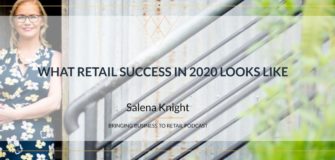The Power of Organizational Culture in the Digital World
Share

ORGANIZATIONAL CULTURE is a system of shared assumptions, values, morals, and beliefs, which governs how people behave in organizations. Retail business is truly a human endeavor while having a positive workplace culture makes for cheerful/satisfied employees. The organizational culture of any company is completely understood by its actions, not its words. Every person (associate, leader, or customer) will immediately sense the atmosphere created either positively or negatively by this credo – by your actions, not your words. It consists of a symbiotic, synergistic invisible, yet tangible thread, that binds all the people involved with the organization.
RETAIL RESOURCE TO ASSIST LEADERS
It is humbling to see so many people resonating with my new book: The Ultimate Retail Manual. It brings me great joy to share the knowledge that I gleaned during my thirty-year tenure within the retail sector as an executive leader with others. I wrote the book to assist other retail/business leaders with adjusting, adapting, and acclimating to the New Retail Ethos we are experiencing in the retail sector.
In addition, the retail manual has an international presence that is resonating with readers in Germany, Mexico, UK, France, Italy, Ireland, Canada, and Australia.
What an honor to share The Ultimate Retail Manual with other countries around the world. In addition, the retail manual has an international presence that is resonating with readers in Germany, Mexico, UK, France, Italy, Ireland, Canada, and Australia.
I felt compelled to write this book because I remember the feeling of being utterly overwhelmed by the breadth of knowledge that is required to become a true servant leader in a retail or business environment.
Because of the paramount importance of organizational culture in today’s retail environment is WHY I dedicated three chapters to this topic in my new book The Ultimate Retail Manual: Strategies for Retailers to Thrive & Succeed in the Digital World.
Organizational culture has five main anchors in which it expresses itself:
1. The ways the organization operates its business.
2. Core values that are never negotiated or diminished by internal/external pressures.
3. How you treat your employees, customers, and vendors.
4. The extent to which autonomous behavior is allowed in making decisions, developing innovative ideas, and personal expression.
5. Are employees committed to achieving corporate objectives?
HOW DO YOU CONDUCT YOUR BUSINESS OPERATIONS?
The first anchor within an organizational culture is how you operate your business. Your operational mindset will determine the environment in which your employees/leaders are working; this will, in a large part, determine their behaviors. Retailers that have established an organizational culture of empathy, compassion, collaboration, and superior ethical standards will usually have an atmosphere which is comprehensive and exudes a “lead by example mentality” that infiltrates every level throughout the entire company.
This individual must become a beacon of light to empower others within the company to ALWAYS OPERATE from a place of honesty, inclusion, and ethical practices.
To fully champion a pervasive, positive culture within your organization, the impetus must start from the very top of the company (the CEO) i.e. “a fish stinks from the head down.” This individual must become a beacon of light to empower others within the company to ALWAYS OPERATE from a place of honesty, inclusion, and ethical practices no matter the current circumstances or the projected outcome. Karma is defined as “the spiritual principle of cause and effect where intent and actions of an individual (cause) influence the future of that individual (effect).” (Wikipedia, n.d.) The Law of Attraction states that “like attracts like.” This energy can either be used constructively or destructively depending on the predominant thought processes of an organization.
ORGANIZATIONAL KARMA is how the intentions of the company (employees/leaders) generate the results the business can expect to receive. Positive/altruistic intentions usually lead to long-term successes while negative/deceptive intentions can create short-term victories. However, short-term victories are not sustainable in the long run. The energy created from these intentions must be returned. Consequently, what goes around comes around.
CORE VALUES NEVER DIMINISHED BY INTERNAL/EXTERNAL PRESSURES
The second anchor is that your core values are never altered by anything. Rather, they are set in stone and are meant to remain rigid to weather the tumultuous retail landscape. The actions that are repeated by your executive team (especially the C-Suite team) will permeate throughout your entire organization like a brush fire. Behaviors are the most powerful determinant of real change and to effectuate organizational change the dominant behaviors must be altered, adjusted to reflect the vision of your company. The timeless expression to describe this is “BE THE CHANGE YOU WISH TO SEE.” Through the principle of the trickle-down effect, your employees and leaders will start to emulate the behaviors of their senior leadership teams while this will correspondingly result in favorable actions for most individuals.
The prominent behaviors (that are selected to alter) of the rest of the organization can be molded through the acronym Q.A.R.O.T: Quantifiable, Actionable, Repetitive, Observable, and Tangible. The catalyst for change is to focus your energies on the most important behaviors (your pillars or values) that you want to change and then allocate the necessary resources to address those specific behaviors assiduously, a.k.a. “the sweet spot.” Many retailers/businesses want to solve every problem which they think that you must completely concentrate on every behavior to achieve. Unfortunately, this stratagem will not be effective if everyone in your company is required to be proficient in every behavioral category.
Read How to: Improving transparency with your employees
HOW DO YOU TREAT YOUR EMPLOYEES, CUSTOMERS, AND VENDORS?
The third anchor is regarding how your organization treats all the individuals working for your company, shopping your stores, and partnering with your stores. Many retailers have intermittent periods of dalliance with the appropriate methods of treating the employees with respect, dignity, and kindness. However, sometimes those periods began to fade into the background as the pendulum swings back to naughty town as the season approaches, a shortage of help is experienced or, there is a change in the leadership team (store, district, division, or C-Suite).
Numerous managers revert to the OLD WAYS of mistreating their employees and utilizing their superfluous fear-based tactics to garner results. Throughout my retail tenure, I remained true to my convictions apropos everyone in the organization should be treated equally and with the same respect and kindness regardless of their position, title, or rank. TREAT EVERYONE YOU MEET/WORK WITH HOW YOU WANT TO BE TREATED. That is how simple it is!
AUTONOMOUS BEHAVIOR
The fourth anchor is the extent to which autonomous behavior is allowed in making decisions, developing innovative ideas, and affording personal expression within your organization. Autonomy in the retail sector (at any leadership level) is having the freedom of choice in making your decisions with the confidence from your superiors to incur mistakes. Also, without having oppressive energy (spoken or unspoken from a superior) constantly hovering around you in which to critique or condemn your pronouncements.
If you study the top technology organizations, you will find a very successful blueprint that is being implemented. There is no harm in “cherry-picking” from other companies that have an efficacious operating strategy. One of the most powerful attributes the technology companies employ is their understanding of the positive impact autonomy has on their organization. They encourage autonomous behavior while rewarding their teams for exemplary results. If you read their press releases, they openly admit that a lot of their top revolutionary ideas come from teams of skilled associates who have full autonomy to achieve their goals. I completely understand that a technology company is different from a retail organization. Nevertheless, the concept of autonomy is being implemented with enormous success.
EMPLOYEES COMMITTED TO ACHIEVING YOUR CORPORATE OBJECTIVES
The fifth anchor is the commitment from your employees in achieving corporate objectives even through tumultuous periods while receiving their full devotion to the organization. This anchor is a strong indicator of how pervasive and impactful your organization culture is being perceived and received by your teams. The retail organizations that have constructed a strong cultural foundation are built upon trust, empathy, inclusion, and caring for their associates. They will receive full support from their teams on a consistent basis in achieving corporate objectives (even some that are considered highly unlikely).
Strong organizational culture will establish an environment of ethical consistency that is experienced throughout the ENTIRE COMPANY, i.e. each district, regardless of geographical location, will be operating identically to other districts throughout the company. Each retailer desires for their employees to be 100% committed to achieving corporate objectives. Likewise, these objectives must be achieved with integrity, transparency, and honest behavior. Otherwise, the objectives just become a means to an end, while creating a slow erosion of the organization culture.
There is a surfeit of positive, caring, and empathetic retail leaders throughout the sector that often get “overshadowed” by some of the mavericks that are operating on their own agenda. Servant Leadership will never go out of style and I want to CONGRATULATE the leaders who truly care about their customers, associates, and vendors. I am an external optimist and I firmly believe that the “Retail Apocalypse” is hyperbole.
There is a changing of the guard which is forcing many retailers to adapt and innovate to the NEW RETAIL ETHOS. This is providing retailers with an opportunity to rise from the ashes with a stronger foothold within their respective niche while foraging into uncharted territories. This, in turn, will galvanize their employees, leaders, vendors, and customers.
I look forward to hearing your thoughts and comments on Organizational Culture best practices that you have performed or seen.
Read The Power Of Organizational Culture In The Digital World Part 2
This post first appeared on LinkedIn.


















Follow us on social media